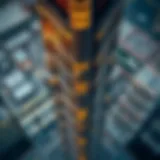Top Private Schools in Dubai: A Comprehensive Guide
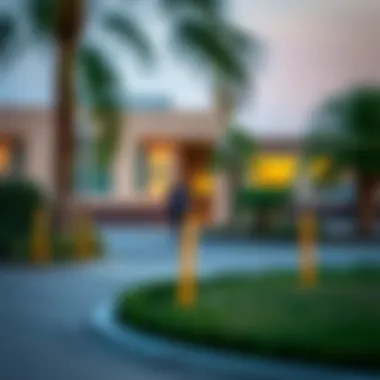

Intro
The educational landscape in Dubai is as diverse as its population. With an influx of expatriates and an array of cultures converging in this dynamic city, the demand for high-quality private education has surged. Parents, whether newcomers or long-term residents, face a dizzying array of options. This article aims to guide you through the intricate web of Dubai's private school landscape, highlighting the key attributes of leading institutions while examining their distinctive offerings.
When considering private education, it’s not just about academics; families often seek a holistic development approach. Many schools boast state-of-the-art facilities, extracurricular activities, and various curricula tailored to fit different teaching philosophies. The choices range from British and American systems to the International Baccalaureate, shaping not only what students learn but how they learn it.
Dubai’s private schools play a significant role in the city’s expat community. They not only cater to the educational needs of the students but also help bridge cultural gaps, creating an environment of inclusivity. As we delve into this guide, we will uncover the market trends surrounding these institutions, providing insights that are pertinent not just for families but also for investors who eye educational facilities as a growing market segment.
By the end of this exploration, you’ll be well-equipped to weigh your options, understanding how each school's offerings align with individual family aspirations and educational goals.
The Shenzhen of Education: Dubai's Private School Landscape
Dubai's private school system is a dynamic tapestry woven with diverse educational philosophies, rich cultural backgrounds, and a shared ambition for academic excellence. This ecosystem mirrors the bustling metropolis it resides in—a city where innovation meets tradition, and global citizens interact seamlessly. Understanding the importance of Dubai's private schools can shed light on the educational pathways available to children, and the distinctive futures they pave the way for.
Foreword to Private Schools
The landscape of private schooling in Dubai is impressive. With over 200 institutions, they cater to a melting pot of nationalities. Families from various corners of the globe find solace in schools that mirror their homeland’s educational values while accommodating the international flair Dubai is known for. Private schools, in essence, serve as nurturing grounds for children, equipping them with knowledge and social skills essential for thriving in today’s intricate world. Notably, they offer tailored curricula, often aligning with international standards, ensuring students remain competitive on any playing field.
Growth of Private Education in Dubai
The surge of private education in Dubai reflects a growing demand rooted in several factors. Key among them is the rapid population growth and the influx of expatriates seeking quality education for their offspring. Statistics show that nearly 75% of students are enrolled in private institutions. This trend has prompted significant investment in educational infrastructure, making Dubai a beacon for top-tier school offerings. The attraction to these institutions often comes from the promise of individualized attention, smaller class sizes, and innovative teaching methods.
A report by the Knowledge and Human Development Authority (KHDA) highlights that many private schools in Dubai demonstrate high academic standards, catering to the educational needs of diverse communities.
Key Features of Private Schools
Navigating the myriad choices, one can appreciate several defining characteristics of Dubai's private schools:
- Diverse Curriculum Options: From the British curriculum to the International Baccalaureate, families can select based on their values and educational preferences.
- State-of-the-Art Facilities: Many schools are equipped with modern classrooms, expansive libraries, and well-maintained sports complexes, ensuring holistic development.
- Extracurricular Activities: Beyond academics, emphasis is placed on arts, sports, and leadership programs that enrich student experiences.
- Community Engagement: Schools often promote parental involvement, fostering a collaborative environment that supports student growth.
These core elements create a unique educational atmosphere that not only prioritizes academic achievements but also focuses on the overall well-being of the child, making them effective contributors to society. In summary, Dubai’s private schools stand out as a microcosm of what educational excellence looks like in a global context, merging diverse backgrounds and forward-thinking approaches into a unified educational experience.
Curricula Offered by Private Schools
The variety of curricula offered by private schools in Dubai is not just a matter of preference; it plays a pivotal role in shaping students' educational journeys. Parents often find themselves weighing different educational philosophies and standards when making decisions about their children's futures. When exploring the best private schools, understanding these curricula can provide significant insights into what each institution emphasizes and how that aligns with the aspirations of families living in Dubai.
The choice of curriculum impacts everything from teaching methodology to assessment styles. Families with international backgrounds, in particular, tend to favor certain curricula based on their home country's educational systems or the prospects available to their children in a globalized world. Below is a closer look at the primary curricula available in Dubai’s private schools.
International Baccalaureate System
The International Baccalaureate (IB) has become a prominent choice among expatriates and local families alike. This system focuses on developing not only academic skills but also critical thinking, intercultural understanding, and personal growth. The IB program is divided into three main educational levels – Primary Years Program (PYP), Middle Years Program (MYP), and Diploma Program (DP). This structure allows for a smooth transition through academic levels.
One of the primary attractions of the IB system is its global recognition. A diploma from an IB school can often open doors to prestigious universities worldwide, a factor parents highly value. Furthermore, the curriculum encourages students to engage in community service and creative projects. This holistic approach not only enriches their academic experience but also fosters responsible citizens who can contribute to their societies.
British Curriculum
The British Curriculum, also known as the National Curriculum, is another popular option in Dubai. Widely recognized for its rigorous academic standards, it typically consists of Key Stages, culminating in the General Certificate of Secondary Education (GCSE) examinations. Schools that adhere to this curriculum often emphasize subjects such as English, Mathematics, and Sciences, allowing students to build a solid foundation before moving into advanced study levels, such as A-Levels.
In the context of Dubai, the British educational system’s structured approach appeals to families looking for a clear academic pathway. The emphasis on examinations can be a double-edged sword, offering a way to measure student progress while also creating pressure. Nonetheless, many British schools in Dubai take measures to balance academics with a supportive school environment.
American Curriculum
The American Curriculum offers a more flexible education model. Typically organized into grade levels (K-12), this system allows students to explore a wider array of subjects and extracurricular activities. It emphasizes critical thinking and a personalized approach to education, which is particularly appealing to families who value creativity and individual expression.
Many American schools in Dubai focus on preparing students for college through Advanced Placement (AP) programs, which can also ease the transition to higher education in the United States. Due to its diverse nature, the American curriculum often incorporates multicultural education, making it an ideal fit for Dubai's cosmopolitan environment.
Other Curricula Options
Aside from the prominent British, American, and IB curricula, Dubai also features schools offering a variety of other educational systems. These include the Indian CBSE, UAE National Curriculum, French Baccalaureate, and German Curriculum. Each curriculum provides unique perspectives and values, presenting families with an extensive range of options to consider.
For instance, schools following the Indian CBSE focus heavily on science and mathematics, with an approach that is known for its systematic pedagogy. On the other hand, the French Baccalaureate emphasizes language and philosophy, catering to a specific demographic within Dubai’s diverse population.
As parents navigate decisions surrounding schooling, the alignment of curriculum with family values and future aspirations remains vital.
In summary, the curricula offered by private schools in Dubai cater to a broad spectrum of educational needs and preferences. Each curriculum has its strengths and potential drawbacks, making it essential for parents to consider their child’s unique needs and goals when selecting a school.
Top Private Schools in Dubai
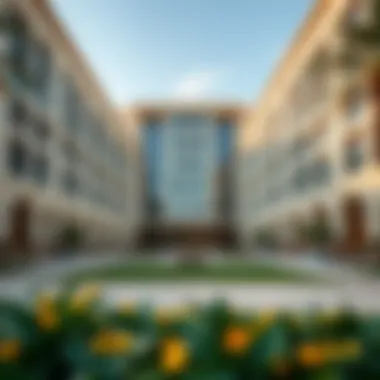

Exploring the realm of private schools in Dubai is not just about finding a place for children to get an education; it’s about searching for institutions that cater to the diverse needs and ambitions of families. The top private schools represent a blend of tradition and innovation, merging global teaching methods with local cultural nuances. As Dubai continues to be a melting pot of cultures and aspirations, having an understanding of its premier educational institutions is crucial for parents and guardians who want the best for their children.
The significance of these schools in the educational ecosystem goes beyond mere academics. They instill values, promote character development, and encourage extracurricular engagement, which plays a pivotal role in shaping well-rounded individuals. Frustrations often arise when trying to identify schools that align with both educational goals and family aspirations. Therefore, through a thorough examination of profiles and offerings, we can shine a light on what makes certain institutions stand apart in a highly competitive landscape.
"Choosing a school in Dubai can feel like navigating a maze; understanding the landmarks can ease the journey."
School Profiles: Overview and Highlights
When it comes to the top private schools, understanding their profiles is not merely about looking at rankings; it's about recognizing what each institution brings to the table. Profiles typically encompass the school's mission statement, vision, and core values, offering a snapshot of its educational philosophy. An insightful overview might include:
- Location and Infrastructure: Where the school is situated and the quality of its facilities, such as libraries, sports complexes, and tech labs.
- Community Engagement: Schools that are deeply embedded in their communities often have a stronger network of support for both students and parents.
- Diversity: With a cosmopolitan populace, schools that celebrate diversity usually foster a more inclusive environment.
School A: Key Features and Offerings
School A stands out for its commitment to holistic education. Here are some key offerings:
- Diverse Curriculum Options: From International Baccalaureate to British systems, it caters to a variety of student needs.
- State-of-the-Art Facilities: Equipped with modern labs and sports areas, the physical environment promotes active learning.
- Emphasis on Local Culture: Regular programs that incorporate local traditions help students connect with their heritage.
The school's approach treats education as a journey, encouraging self-discovery and initiative.
School B: Student Success Stories
At School B, student achievements are noteworthy. They have consistently produced top-tier results in international assessments. For parents looking for proof of efficacy, consider:
- Alumni Network: Many graduates go on to prestigious universities across the globe.
- Scholarships and Competitions: The school has a strong track record of students winning academic scholarships, showcasing the quality of its educational offerings.
These success stories lend credence to the institution’s reputation and offer hope for prospective families.
School C: Unique Educational Approach
School C follows a unique methodology that integrates traditional and progressive education models. Its distinctive features include:
- Project-Based Learning: Students engage in real-world problems, developing critical thinking and collaboration skills.
- Personalized Learning Plans: Individual academic and personal growth plans that cater to the varying abilities of students, ensuring no one falls through the cracks.
This adaptive learning environment fosters a breadth of skills, preparing students for the complexities of the 21st century.
School D: Extracurricular Activities
Extracurricular activities are the icing on the cake at School D. Unlike just focusing on academics, this school believes in offering a well-rounded education that includes:
- Sports Programs: Opportunities for both competitive and recreational sports help foster teamwork and discipline.
- Arts and Performance: The school boasts robust programs in music, drama, and visual arts, encouraging creativity and self-expression.
- Community Service: Regular initiatives give back to society, enriching students' understanding of their role in the community.
This multifaceted approach ensures that students walk away with skills and passions that span beyond textbooks.
Admission Processes and Requirements
The admission process in private schools can often feel like a labyrinth, especially in a city as dynamic as Dubai. Understanding the nuances of these processes is paramount for parents aiming to secure the best educational environment for their children. Each school may have its own set of criteria, but generally speaking, there are common components that families should keenly consider when exploring their options.
The significance of getting a handle on admission processes can't be overstated. It not only affects the immediate educational experience but can also set the tone for a child’s lifelong learning journey. A well-informed choice leads to a smoother transition for students, providing them with a supportive and enriching atmosphere that nurtures their intellectual and social growth.
General Admission Guidelines
Navigating the general admission guidelines is akin to following a road map—essential yet at times convoluted. Typically, most schools in Dubai operate on a first-come, first-served basis, meaning that waiting too long could lead to missing out on a spot. Here are some pointers:
- Age Requirements: Schools have specific age thresholds for each grade. Be sure to familiarize yourself with these requirements, which can vary significantly.
- Application Timelines: It’s vital to be ahead of the game. Many schools require applications to be submitted several months before the academic year begins. Mark your calendar, so you don't miss the submission window.
- Parent Interviews: Some institutions may request a meeting with parents to discuss their educational philosophy and expectations. This serves as an opportunity for schools to gauge compatibility with their community.
Documentation Needed for Admission
When it comes to documentation, having a checklist can be a lifesaver. Hubris can lead one to believe all paperwork is straightforward, but missing documents can delay the process. Commonly required documents include:
- Birth Certificate: A legal proof of the child’s age is often mandatory.
- Previous Academic Records: For older children, schools need to see past report cards or transcripts.
- Health Records: Immunization records assure schools of the child's health status.
Each school may have specific demands, so contacting them directly to clarify requirements is advisable. A little diligence goes a long way in smoothing out the process.
Interviews and Assessments
Interviews and assessments serve as critical junctures in the admission process where schools ascertain the suitability of a candidate. These evaluations can vary widely, but here's a glimpse into what may unfold:
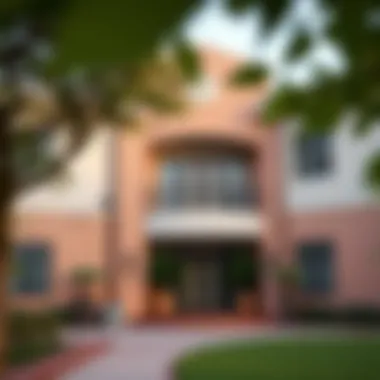

- Student Interview: Some schools may conduct interviews with the child to evaluate their readiness for the school environment. Questions can range from personal interests to educational preferences.
- Aptitude Tests: Many private schools will require students to take standardized tests to assess their academic abilities. These scores help schools understand a child’s strengths and areas needing improvement.
- Parent Interviews: Beyond the child, schools often engage with parents through interviews emphasizing family values and educational expectations. This dialogue helps schools create a cohesive understanding of their future students.
In sum, while the admission process might feel daunting, familiarizing oneself with these essential elements lays a foundation for successfully navigating the landscape of private education in Dubai. Equipped with the right information, parents can make informed decisions that lead to a fruitful educational journey for their kids.
Factors to Consider When Selecting a School
Selecting a private school in Dubai can feel akin to finding a needle in a haystack; it's a daunting task with so many options available. However, narrowing down choices to ensure the right fit for your child requires a thoughtful approach. No two schools are the same, and each institution comes with its unique set of characteristics that can either support or hinder your child's educational journey. In this section, we will delve into several fundamental elements that deserve consideration, benefiting not just students but parents alike.
Location and Accessibility
When deciding on a school, the location sits at the crux of the decision-making process. A school that's just down the road may ease daily commutes, but it's critical to weigh other aspects like traffic patterns and potential delays. For families residing in areas like Jumeirah or Downtown Dubai, proximity to the school may significantly alter daily schedules. Considerations should also extend to public transport availability and parking arrangements, especially during peak hours.
- Distance from Home: Reduces travel time and promotes attendance, particularly for younger children.
- Transportation Options: Check what public transport or school bus services are available.
- Community Accessibility: A school that fosters strong connections within the local community might offer additional opportunities for enrichment.
- Safety: Evaluate the neighborhood surrounding the school. A safe, friendly area can be a huge advantage.
The belief that an education-oriented environment plays into a child's wellbeing cannot be understated; thus, a suitable location is paramount in this equation.
Tuition Fees and Budgeting
Budgeting for education can be akin to planning for a road trip—if you fail to map things out properly, you may find yourself lost. Private schools in Dubai offer a spectrum of tuition fees ranging from the comfortably affordable to the exorbitantly expensive, reflecting their facilities, reputation, and quality of education. Here are some points to ponder:
- Annual Fees: Understand the scale of fees from each institution you are considering. Schools may charge between AED 25,000 to AED 120,000 or more.
- Additional Costs: Factor in uniforms, textbooks, extracurricular activities, and other hidden expenses that could add up.
- Payment Structure: Is tuition paid in one lump sum, or can it be broken down into installments? Some institutions may offer lenient payment plans that could ease the financial pressure.
- Scholarships and Financial Aid: Check whether the school provides any financial assistance for qualifying families. Some schools offer scholarships based on merit or need.
Taking a long, hard look at the budget and understanding which schools align with financial capacity is crucial for ensuring that parents do not bite off more than they can chew.
School Culture and Values
Beyond academics, the ethos and values of a school significantly shape a child's social and moral upbringing. Each institution cultivates a unique environment that reflects its guiding principles. When appraising a school's culture, keep in mind:
- Inclusive Atmosphere: A welcoming school is one where children from various backgrounds feel at ease and understood. This can also help foster empathy in your child.
- Discipline and Policies: Understand the school's code of conduct and disciplinary measures. A school that enforces firm yet fair rules can create a balanced environment.
- Parent Involvement: Names can be deceiving, but schools that actively promote parent engagement tend to create a stronger community feeling and enhance student success.
- Values and Mission: Take into account how well the school's mission aligns with your family's values. A shared vision can enrich the educational experience.
In summary, when selecting a school, it’s paramount to look beyond mere academics. The culture within the walls of the institution can play a striking role in shaping a child’s character and values for years to come.
"Education is not just about filling a pail, but the lighting of a fire."
This quote highlights how vital it is to consider both logistical and intrinsic factors when choosing the right fit for your child's education.
Extracurricular and Enrichment Programs
Extracurricular activities play a pivotal role in a well-rounded education. In Dubai's private schools, these programs are not just an afterthought; they are intricately woven into the fabric of the educational experience. Schools recognize that students gain valuable skills outside of the traditional academic classroom, nurturing their social, emotional, and physical wellbeing.
Through varied extracurricular offerings, schools aim to develop diverse talents and interests, allowing students to explore potential career paths and personal passions.
"An investment in knowledge pays the best interest." - Benjamin Franklin
The benefits of these programs are manifold. They foster teamwork, boost self-esteem, and can even cultivate leadership skills. A student who participates in a sports team learns about commitment, discipline, and perseverance.
Sports and Physical Education
Sports are a major focus for many private schools in Dubai, reflecting a commitment to physical health and team spirit. Schools often boast a range of competitive and recreational sports like football, basketball, swimming, and even archery. The emphasis is on not just participating, but excelling.
By engaging in sports, students can develop physical coordination while simultaneously learning about competition and sportsmanship. Moreover, sports programs often lead to the formation of friendships that last well into adulthood. For expats, these interactions can ease the transition into a new environment, helping to build a sense of community.
Arts and Creativity
Artistic expression is a cornerstone of several private school curricula in Dubai. Schools invest in robust arts programs that include visual arts, music, drama, and dance. This focus is crucial for nurturing creativity, which is becoming increasingly valued in today’s job market.
Participating in artistic endeavors not only enhances fine motor skills but also fosters personal expression and emotional resilience. Programs often culminate in exhibitions or performances, showcasing students’ work to parents and the broader community. This not only boosts student confidence but also fosters an appreciation for the arts.
Leadership and Community Service Initiatives
Many private schools in Dubai emphasize the importance of community service and leadership training. Students are often encouraged to engage in community service projects, which can range from feeding the homeless to environmentally sustainable initiatives like tree planting or recycling drives.
These experiences are invaluable, broadening students' perspectives and helping them understand the value of giving back to society. Involvement in leadership initiatives, such as student councils or peer mentoring programs, also prepares students for future roles in diverse fields. Such skills are vital, whether the students choose to embark on a business career or serve in governmental positions.
In summary, extracurricular and enrichment programs in Dubai’s private schools are vital. They contribute significantly to developing well-rounded individuals who are equipped for both academic success and societal contribution. Parents prioritizing robust extracurricular options should explore schools that not only offer a variety of activities but also foster a culture of growth and inclusivity.
The Role of Technology in Education
In the landscape of modern education, technology plays a pivotal role, particularly in private schools across Dubai. As educational institutions strive to equip students for a fast-evolving world, the integration of technology becomes paramount. It isn’t just about installing a few smartboards or digital projectors; it’s about creating an immersive learning environment that stimulates creativity, encourages collaboration, and develops critical thinking skills. Parents and educators alike recognize that proficiency in technology is not merely an advantage, but a necessity in today’s job market and society.
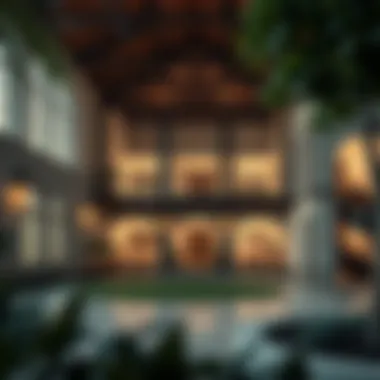

Integration of Digital Tools
The integration of digital tools in classrooms isn't just a passing trend; it's become a core element of the educational framework in Dubai. Schools are now incorporating various digital tools to enhance curriculum delivery and student engagement. This can range from learning management systems to virtual and augmented reality experiences that bring lessons to life in ways that traditional resources simply can't match.
- Interactive Learning Platforms: Tools like Google Classroom or Microsoft Teams allow teachers to organize and distribute assignments efficiently while maintaining an ongoing dialogue with students. These platforms help facilitate a fluid communication flow between students and educators.
- Smart Classrooms: Many schools are adopting smart technology to create an interactive learning environment. Think digital projectors, touch screens, and even student response systems that allow real-time feedback during lessons. This interactive nature keeps students engaged and enhances comprehension.
- Educational Apps: Private schools in Dubai are increasingly using educational applications tailored for various subjects. These apps allow for personalized learning experiences, enabling students to work at their own pace. They support everything from math to science and even soft skills development through gamified learning.
"Technology is most effective when it complements and enhances an existing educational framework, rather than replaces it."
This holistic approach ensures that while technology is utilized, traditional learning methods are not thrown aside. Instead, the two methodologies work hand-in-hand to create well-rounded educational experiences.
Online Learning Platforms
The emergence of online learning platforms has reshaped the educational arena significantly. Especially pertinent during periods of disruption (like the global pandemic), platforms such as Khan Academy, Coursera, or even local initiatives have enabled continuity in education.
- Flexibility and Accessibility: Students can access materials whenever and wherever they want. This flexibility caters to different learning styles and allows students to revisit complex topics or advance as they see fit.
- Diverse Learning Resources: Online platforms host a wide variety of resources, from instructional videos to interactive quizzes. This wealth of information not only supports classroom teachings but also empowers students to take charge of their own learning.
- Collaboration and Networking: Many online learning environments foster collaboration among students, even those from different parts of the world. This connectivity prepares students for a globalized workforce.
Parental Involvement and Communication
Successful education is more than just what happens inside school walls; it extends into the home environment, where parents play a critical role. In the context of Dubai's private schools, parental involvement and communication can significantly enhance a child's learning experience and academic performance. The blend of diverse cultures and high expectations in Dubai makes strong partnerships between parents and schools essential for fostering a supportive educational landscape.
One of the primary benefits of active parental involvement is nurturing a sense of community. When parents engage with teachers and school officials, it creates a network of support, benefiting not only their own children but also enriching the school environment as a whole. This collaboration can lead to shared resources, knowledge, and experiences that promote educational advancement. Engagement often translates into greater awareness among parents regarding their children’s strengths, weaknesses, and educational needs.
Building Strong School-Parent Partnerships
Establishing open lines of communication is crucial for building strong partnerships between schools and parents. Effective communication begins with regular meetings between educators and families.
- Schools may hold orientations and workshops to inform parents of curriculum updates and educational strategies.
- Platforms like newsletters, school portals, and social media channels play an important part in keeping parents in the loop about school events, programs, and initiatives.
When parents feel informed, they are more inclined to participate in school activities, which can encourage a sense of belonging and shared goals. Virtual communication options also cater to busy schedules, allowing parents who may be traveling or balancing work commitments to stay in touch seamlessly.
Moreover, private schools in Dubai often foster a culture of involvement through volunteer programs and community events that require parents to pitch in. This cooperation helps build trust and respect between parents and school staff, ultimately benefiting students.
Regular Updates and Progress Reports
Regular updates and feedback are vital components of effective communication between schools and parents. Schools that prioritize this kind of transparency promote an atmosphere of trust, where parents feel their input is welcome and valued.
- Progress reports, whether bi-weekly or term-based, provide insights into student performance, attendance, and any areas needing improvement.
- Parent-teacher conferences offer an opportunity for direct dialogue about student progress and challenges, allowing parents to express concerns or seek guidance.
Real-time academic tracking tools can also make a profound difference, giving parents access to their child’s grades and assignments, ensuring they are active participants in their educational journey.
Maintaining an ongoing dialogue between parents and educators is pivotal for the child’s success. This partnership provides encouragement for students, reinforcing the importance of education along with accountability in their learning process.
In a multicultural environment like Dubai, ensuring that all families have equitable access to information can present challenges. Therefore, utilizing multiple languages in communications encourages inclusivity, allowing non-native English speakers to engage meaningfully in their child’s academic life.
The End
Culmination: Making Informed Choices
In the dynamic realm of private education in Dubai, the decision-making process for parents and guardians often feels overwhelming. This conclusion serves as a pivotal moment to distill the rich information presented throughout this article, reinforcing the importance of making informed choices that align with each family's unique context and aspirations.
When exploring the best private schools, numerous elements come into play. These include not just the curricula offered, but also the school's values, culture, and extracurricular opportunities. Such factors shape a child's educational experience, influencing their development far beyond academic achievements. Therefore, it is crucial for families to engage thoroughly with all available insights before making a commitment.
Understanding key considerations might look like this:
- Curriculum: As we highlighted, options vary significantly from the International Baccalaureate to the British and American systems. Families need to consider which curriculum aligns best with their child's future goals.
- Location and Accessibility: Proximity to home can greatly affect daily routines and overall convenience. A school that's a stone's throw away saves time and ensures less stress in commutes.
- Tuition Fees: Understanding different fee structures and the financial implications thereof is essential before settling on a school. Budgeting for education can mean finding the right balance between quality and affordability.
- Extracurricular Activities: A school's commitment to holistic education—through sports, arts, and leadership programs—should also weigh heavily in your decision. These programs contribute significantly to personal growth and skill development.
Ultimately, the choice of a private school in Dubai isn't merely about finding an institution; it's about investing in a nurturing environment that supports a child’s intellectual, social, and emotional growth. Making an informed choice founded on available insights ensures a better fit for students and families alike.
"Education is a shared commitment between dedicated teachers, motivated students, and enthusiastic parents with high expectations."
— Hillary Clinton
Summarizing the Insights
As we wrap up, it’s beneficial to summarize the insights gleaned from our exploration of Dubai's private education landscape. The rich diversity of schools available, supplemented by various curricula, presents parents with a smorgasbord of choices. Each institution comes with its unique characteristics, which cater to different needs and preferences. Parents should take into account aspects like teaching methodologies, school culture, and available resources to ensure they find the best fit for their children.
Moreover, the growth of private education in Dubai reflects not only the expanding population of expatriates but also the increasing competition among schools to be at the forefront of educational excellence. Understanding this evolving landscape allows parents to navigate their options more effectively and make decisions that will benefit their children both in the short and long term.
Future Trends in Private Education in Dubai
Looking ahead, several trends are likely to shape the future of private education in Dubai. One significant trend is the continual integration of technology into the classroom. Digital platforms and learning tools are becoming commonplace, with schools investing in state-of-the-art resources that facilitate personalized learning experiences.
Additionally, the emphasis on sustainability and global citizenship is gradually weaving itself into school curriculums. More institutions are adopting programs that encourage awareness of environmental issues and social responsibility, preparing students for a world that increasingly values these principles.
Furthermore, as the demographic landscape continues to evolve, schools will likely adapt their pedagogical approaches to cater to an even broader range of cultural and academic needs. This shift not only enhances the educational environment but also enriches the learning experiences for all students. The future of education in Dubai promises to be as vibrant and diverse as the city itself, making informed choices paramount for parents seeking the best for their children.








